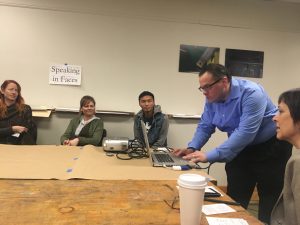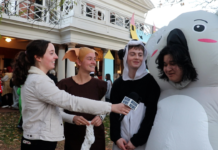On Wednesday, March 1st, film enthusiast, lecturer, screen writer and music composer Matt Marshall gave a storyboard workshop in the VABC (Virginia Arts of the Book Center). While it was a small-scale workshop, artists, writers and students came out to learn more about storyboarding from Marshall.
Professor Marshall’s endeavor in montage and storytelling traces back to 1993 when he began studying at the State University of New York. During his time as an undergraduate student, he took a Cinema as an Art Form class and found montage and film language fascinating. He watched movies in a projector 35mm prints and fell in love with classic Russian silence films and the technique employed by them. Professor Marshall now teaches courses in film history and criticism at UVA, and his course Cinema as an Art Form is very popular amongst students. Meanwhile, he is also involved in composing music for film and stage.
Creating a narrative is crucial in the process of artistic endeavors, and storyboarding is widely applied in the establishment of a narrative—it explores how a set of pictures could convey and alter the meaning of a story. In the workshop, Professor  Marshall first elaborated on film structures, montages and mise-en-scene (scene construction). For example, by demonstrating the Cartesian Coordinate system, he showed people’s unconscious preference on scene construction in films and pictures. At the end of the workshop, he approached the storyboard in a fascinating and expressive way by showing a set of pictures composed of photos instead of graphics components. Professor Marshall successfully demonstrated several different ways that a story can unfold, and he explained how the behind a story can be altered every time it is viewed by a different prospective.
Marshall first elaborated on film structures, montages and mise-en-scene (scene construction). For example, by demonstrating the Cartesian Coordinate system, he showed people’s unconscious preference on scene construction in films and pictures. At the end of the workshop, he approached the storyboard in a fascinating and expressive way by showing a set of pictures composed of photos instead of graphics components. Professor Marshall successfully demonstrated several different ways that a story can unfold, and he explained how the behind a story can be altered every time it is viewed by a different prospective.
When asked about his favorite films, Marshall mentioned the Russian film Ivan the Terrible, about Ivan IV of Russia. “Everything is there for a reason, and it’s done in a very mannered style. It is visually overwhelming.”
Professor Marshall is currently composing live ensemble music for a play called Shipwrecked by American playwright and Pulitzer winner Donald Margulies. It takes place in the late 19th century on a ship leaving from England to Australia, where they encounter the aborigine. “What is exciting in the composing process, said Marshall, is combining Victorian England and traditional Aboriginal music and mimicking the tone on the cello and guitar.”
















